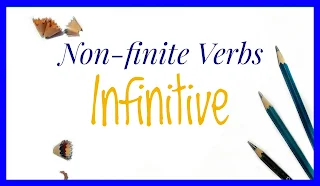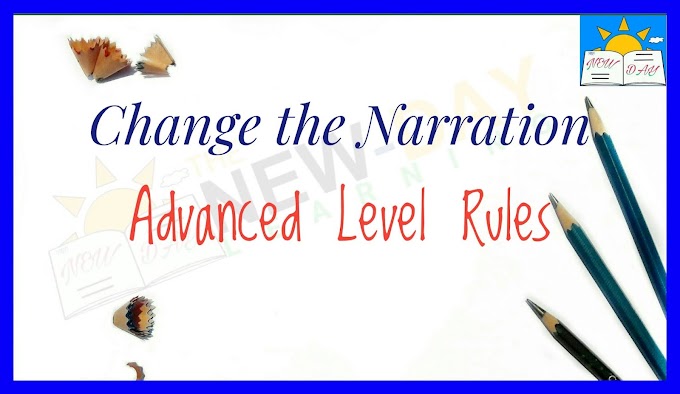Look at the following sentences. The sentences consist of infinitive.
So, here we find that there are two types of infinitive –
Here the infinitives to take, to live, to cheer, to sleep are qualifying the nouns permission, house, audience, time respectively. Hence the infinitives are used here as adjectives.
The infinitives to walk, to get, to visit, to meet, to listen are modifying the adjectives weak, easy, eager, happy, ready respectively. Hence, these infinitives are adverbs.
The infinitives to be, to be, to be, to tell are modifying the respective clauses. Hence, these infinitives are adverbs.
Base form of the main verb without a to.
- I come to see my daughter.
- Let me see my daughter.
So, here we find that there are two types of infinitive –
- To-infinitive (or, Infinitive with to) and,
- Bare infinitive. (Infinitive without to)
1) To-infinitive:
Structure – A to-infinitive is formed with 'to' plus verb (base form) i.e. to + V1.- I like to eat pizza.
- Ramit loves to criticise the government.
Use of To-infinitive:
Used as the subject –
- To err is human.
- To forgive is divine.
- To love is greatness.
- To laugh is an exercise.
Used as the object –
- I am going to sleep.
- He wanted to succeed.
- She decided to travel.
- We love to swim.
Used as subject compliment –
- My dream is to travel.
- Our duty is to serve.
- The most important thing is to study.
- His ambition is to rise.
Used as adjective –
- I have no permission to take action.
- He has no house to live in.
- There is no audience to cheer.
- This is time to sleep.
Here the infinitives to take, to live, to cheer, to sleep are qualifying the nouns permission, house, audience, time respectively. Hence the infinitives are used here as adjectives.
Used as adverb –
- I am too weak to walk.
- It is not easy to get a job nowadays.
- We eager to visit the zoo.
- They were happy to meet their parents.
- We are ready to listen.
Used with Help:
- She helped me to solve the math problem.
- She helped me solve the math problem.
Actually, with help, both to infinitive and bare infinitive are used.
- To be more particular, you should not come here frequently.
- To be specific, we have to finish the work before 9th March.
- To be honest, I am not a good footballer.
- To tell the truth, I am not attentive at all.
The infinitives to be, to be, to be, to tell are modifying the respective clauses. Hence, these infinitives are adverbs.
Use of bare infinitive-
Base form of the main verb without a to.
- I read books.
- John does not talk to me.
- Why did you laugh.
- We swim everyday.
Though there is no to before the verbs write, laugh, complete, all these are infinitives because, they do not change their form according to subject or tense.
These are called bare infinitives.
Used with modal auxiliary verbs –
- I will become a police officer.
- We shall win.
- You can do it.
- He could call her.
- Sam may drive today.
- John must write to his boss.
- I dare not go there.
- You needn’t say sorry.
Used with Make:
- The movie makes him cry.
- You made me laugh.
- It makes me feel good.
Used with Help:
- She helped me solve the math problem.
- She helped me to solve the math problem.
Actually, with help, both to infinitive and bare infinitive are used.
Used with Let:
- Let me complete my part.
- Let us play chess.
Used with the verbs of perception like see, feel, watch, notice, hear:
- Did you see the man go?
- I heard them laugh.
- We feel the car move.
Used with but or except:
If there is a do (do, did, does) as an action verb, and but or except in a sentence.- I did nothing but sleep. (But + to + sleep will be wrong)
- She does everything but smile. (But + to + smile will be wrong)
- He does nothing except play. (Except + to + play will be wrong).
But,
if there is not a 'do' as an action verb, a to-infinitive is used.
- I tried nothing but to stay home during the pandemic.
- We try everything except to be happy.
- We want nothing but to become successful.
Used with why:
- Why bother the poor puppies? (To + bother is incorrect)
- Why not accept the challenge? (To + accept is incorrect)
With expressions like - would rather, had better, rather than etc.
- I would rather stay home and watch a movie.
- You had better keep silence.
- She prefers to walk rather than take a bus.
Credit:
We took reference from Lucent's General English book for this article.
Thank you...





%20(1).webp)


%20(1).webp)
1 Comments
The text is presented in a simple, lucid manner. Easy to understand, too.
ReplyDeleteLeave a comment